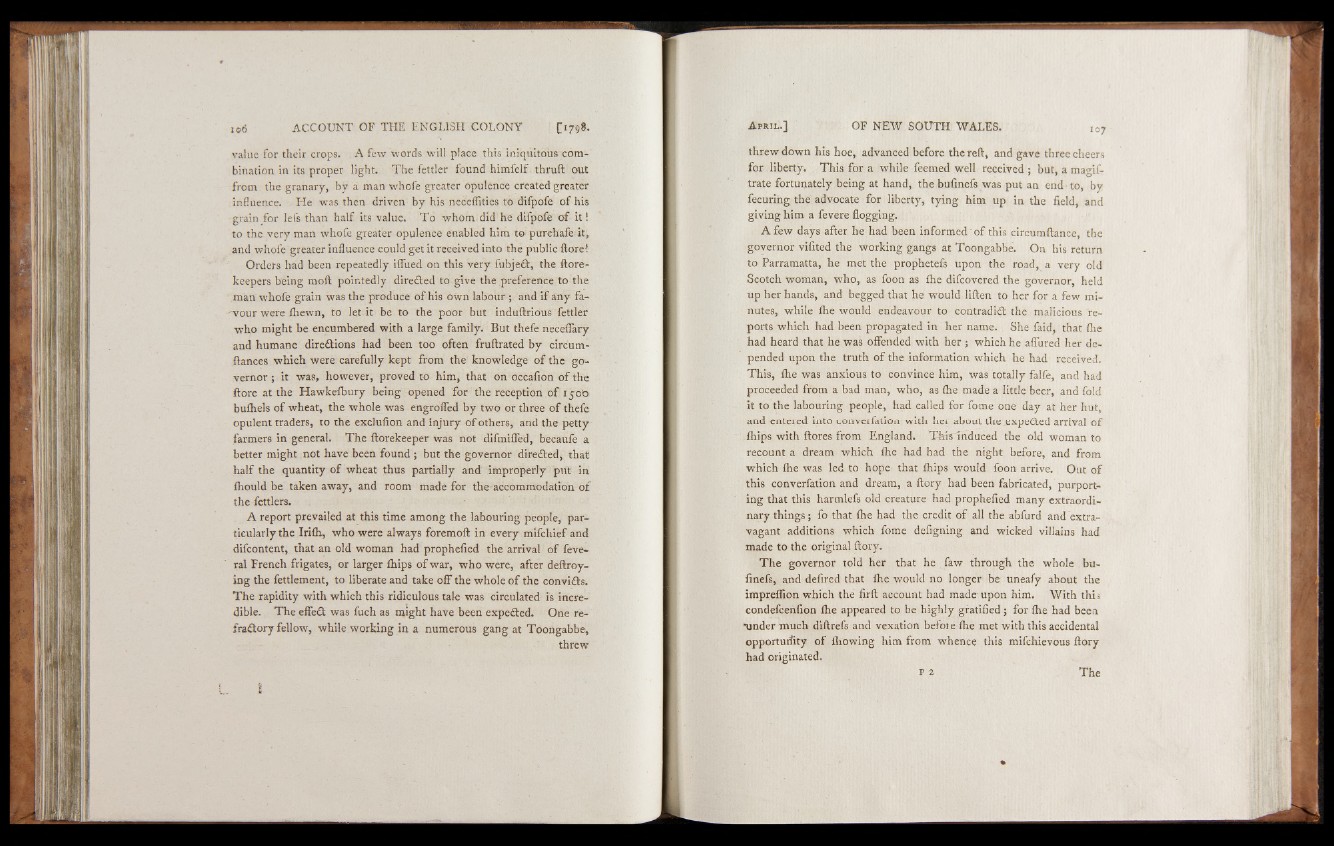
ACCOUNT OF THE ENGLISH 106 COLONY [1798.
value for their crops. A few words will place this iniquitous combination
in its proper light. The fettler found himfelf thruft out
from the granary, by a man whofe greater opulence created greater
influence. He was then driven by his neceffities to difpofe o f his
grain for lefs than half its value. To whom did he difpofe o f i t !
to the very man whofe greater opulence enabled him to purehafe it,
and whofe greater influence could get it received into the public ftore!
Orders had been repeatedly iflfued on this very fubjeCt, the ftore-
keepers being moll pointedly directed to give the preference to the
man whofe grain was the produce of his own labour ; and if any favour
were Ihewn, to let it be to the poor but induftrious fettler
who might be encumbered with a large family. But thefe neceffary
and humane directions had been too often fruftrated by circum-
ftanceS which were carefully kept from the knowledge o f the governor
; it was, however, proved to him, that on occafion o f the
ftore at the Hawkefbury being opened for the reception o f 150b
bulhels of wheat, the whole was engroffed by two or three o f thefe
opulent traders, to the exclufion and injury o f others, and the petty
farmers in general. The ftorekeeper was not difmiffed, becaufe a
better might not have been found ; but the governor directed, that
half the quantity of wheat thus partially and improperly put in
fhould be taken away, and room made for the accommodation o f
the fettlers.
A report prevailed at this time among the labouring people, particularly
the Irifli, who were always foremoft in every mifchief and
difcontent, that an old woman had prophefied the arrival of feve-
ral French frigates, or larger {hips o f war, who were, after deftroy-
ing the fettlement, to liberate and take off the whole o f the convicts.
The rapidity with which this ridiculous tale was circulated is incredible.
The effeCt was fuch as might have been expeCted. One refractory
fellow, while working in a numerous gang at Toongabbe,
threw
A p r i l . ] OF NEW SOUTH WALES. 107
threw down his hoe, advanced before the reft, and gave three cheers
for liberty. This for a while feemed well received ; but, a magif-
trate fortunately being at hand, the bufinefs was put an end to, by
fecuring the advocate for liberty, tying him up in the field, and
giving him a fevere flogging.
A few days after he had been informed of this circumftance, the
governor vifited the working gangs at Toongabbe. On his return
to Parramatta, he met the prophetefs upon the road, a very old
Scotch woman, who, as foon as {he difcovered the governor, held
up her hands, and begged that he would liften to her for a few minutes,
while {he would endeavour to contradict the malicious reports
which had been propagated in her name. She faid, that {he
had heard that he was offended with her ; which he aflured her depended
upon the truth o f the information which he had received.
This, Ihe was anxious to convince him, was totally falfe, and had
proceeded from a bad man, who, as {he made a little beer, and fold
it to the labouring people, had called for fome one day at her hut,
and entered into converfation with her about the .expeCted arrival of
{hips with {lores from England. This induced the old woman to
recount a dream which {he had had the night before, and from
which {he was led to hope that fhips would foon arrive. Out of
this converfation and dream, a ftory had been fabricated, purporting
that this harmlefs old creature had prophefied many extraordinary
things; fo that {he had the credit o f all the abfurd and extravagant
additions which fome defigning and wicked villains had
made to the original ftory.
The governor told her that he faw through the whole bufinefs,
and defired that {he would no longer be uneafy about the
impreflion which the firft account had madoupon him. With this
condefcenfion {he appeared to be highly gratified; for {he had been
•under much diftrefs and vexation befoie {he met with this accidental
opportunity o f {bowing him from whence this mifchievous ftory
had originated.
p 2 The